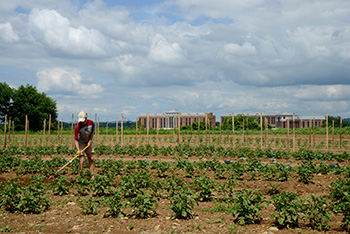Organic Farm Provides On-site Nutrition
 EASTON, Pa. – Patients and staff can’t complain much about the food at St. Luke’s Hospital Anderson Campus in Easton.
EASTON, Pa. – Patients and staff can’t complain much about the food at St. Luke’s Hospital Anderson Campus in Easton.
St. Luke’s University Health Network partnered with Rodale Institute in July to build an organic farm on the hospital’s 500-acre campus. Fresh produce from the garden is used daily in cafeterias at the health network’s six hospital locations. The Anderson Campus health care facility overlooks the 5-acre farm, and the St. Luke’s network hopes to show patients and visitors that they can get a healthy, healing environment outside hospital walls. They hope it may even inspire some to start their own organic farm and become an organic gronomist. The food is being served to patients, staff and visitors as a way to promote the health and well-being of patients and the community.
By the end of this year, Rodale Institute expects to grow about 44,000 pounds of fresh produce. The farm will eventually double in size, producing almost 100,000 pounds of produce, according to Mark Smallwood, executive director for the Rodale Institute.
“In addition to providing patients, families and staff at the hospitals with fresh, organic produce, organic agriculture builds healthy soil,” Smallwood said in a statement. “Organic agriculture reduces pollution from run-off, prevents toxic chemicals from building up in our ecosystem and is a primary driver in carbon sequestration. This partnership presents a farm to hospital model, which can be replicated around the world. We’re proud to be proving concepts once thought impossible.”
Tending the farm is left up to one woman – Lynn Trizna, an on-site organic vegetable farmer. She is responsible for following organic farming practices and coordinating deliveries with Sodexo, a food services provider based in France that works with the hospital network. She also oversees the organic certification process with the USDA.
A 1,120-square-foot hoop house located on the farm, provided through fundraising from St. Luke’s Auxiliary, will help extend the growing season.
“Through the partnership between St. Luke’s University Health Network and the Rodale Institute, the farm will accomplish what was thought previously impossible, growing organic and nutritious food on site for hospital patients,” Trizna said in a statement. “The farm will act as an evolving model for institutions across the country as well as for farmers who have the knowledge but lack the resources to start their own farm. St. Luke’s Anderson Campus and the Rodale Institute are planting a seed in sustainable and local food production.”
St. Luke’s isn’t the first facility to provide direct farm-to-hospital produce. St. Joseph Mercy Ann Arbor in Michigan plowed into 4 acres of the hospital’s land in 2010 to establish an on-site garden. Produce that isn’t consumed inside St. Joseph’s is sold at a weekly farmers’ market in the hospital’s lobby. To help with the upkeep of this farm produce, farmers can implement metal buildings Michigan storage so they are keeping it all fresh.
Dozens of other health networks and hospitals are supplying healthier food or starting initiatives to get patients, staff and visitors to eat better, according to Health Care Without Harm, a global organization that encourages environmentally responsible health care. The organization urges those in the health care industry to take its Healthy Food in Health Care Pledge.
“Working with the Rodale Institute to develop an organic, working farm on site will allow St. Luke’s to continue providing patients with a holistic health care experience that creates a positive atmosphere for health and healing,” said Ed Nawrocki, president, St. Luke’s Anderson Campus. “By providing patients with locally grown organic produce, St. Luke’s is showing a commitment to the environment and promoting the health of its patients and the community.”
